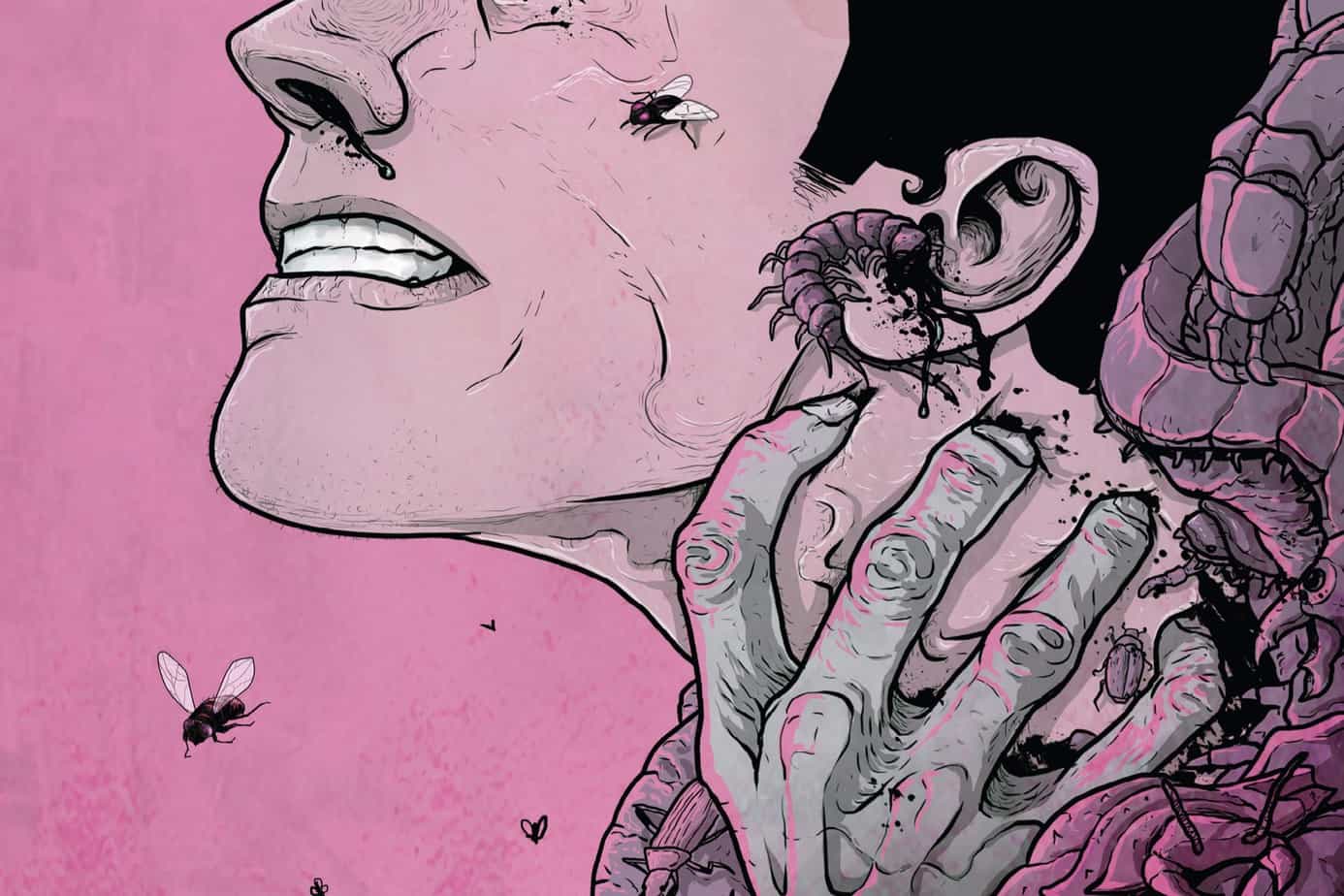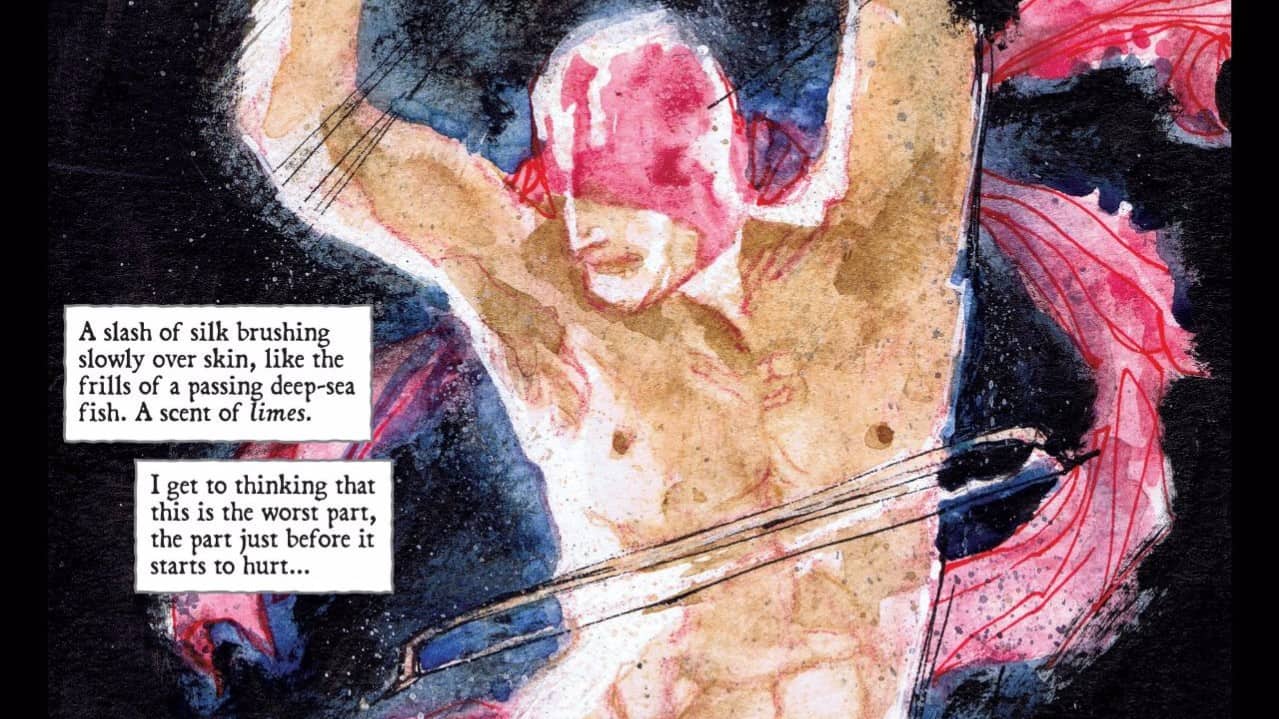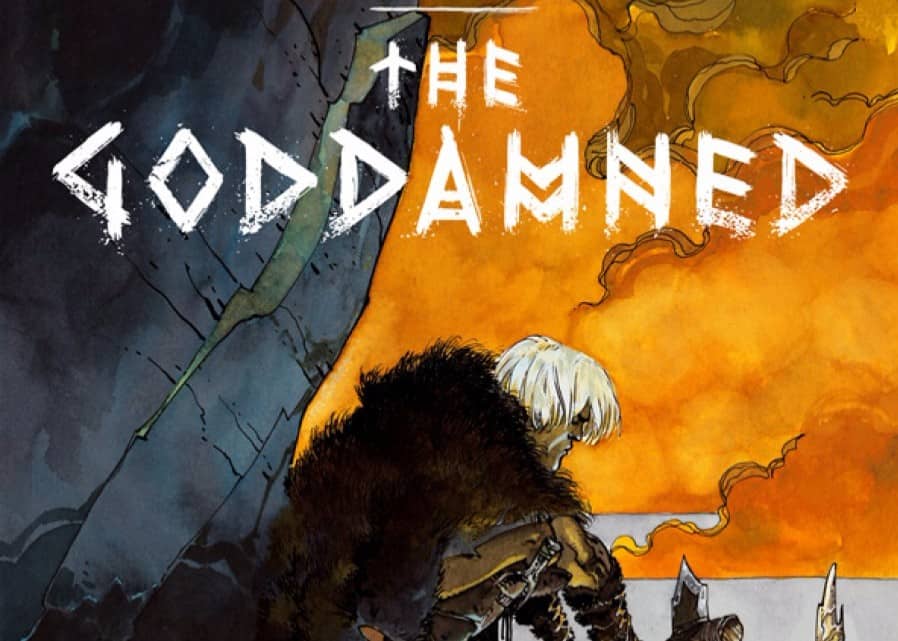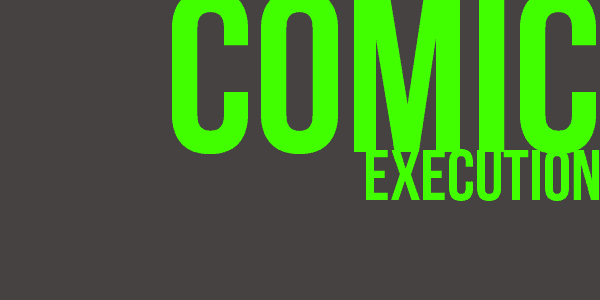
[Comic Execution] 12/12 – BITCH PLANET, SQUARRIORS, ETERNAL
Remember my review of Snowpiercer?
Well, I do, and that’s all that matters, because I had a revelation recently about that comic-turned-movie. You see, at my place of employment, they’ve been showing holiday movies, as retail outlets are wont to do when they’re trying to sell TVs (even though it’s damn grocery store). And they’ve been showing a movie that, even as I try desperately to ignore it, has gradually transformed from a painfully-deformed specter of childish inanity to a foreboding, hideous larvae. This movie is, in fact, The Polar Express. Or, as it was originally called, Snowpiercer Part One! That’s right, I’m on to your games, Tom Hanks and Robert Zemeckis. You clearly read the then untranslated French graphic novel Snowpiercer about a seemingly unstoppable train howling across an alien wasteland of snow and ice and whose passengers represent humankind and decided that it would be a smash hit several decades later but right just then you needed a holiday movie for kids and so WHY NOT MAKE BOTH. You evil bastards.
You wonderful, evil bastards.
BITCH PLANET #1
Writer: Kelly Sue Deconnick
Artist: Valentine de Landro
Colorist: Cris Peter
Publisher: Image Comics
Price: $3.50
In my previous review I mentioned briefly that Christopher Sebela, who got more than his fair share of attention last week here, worked with Kelly Sue Deconnick on Ghost for Dark Horse and that was his debut in this column. We’ve actually had our fair share of Deconnick here as well, her Pretty Deadly receiving positive reviews in this column back in 2013, right around this same time of year in fact, so it’s highly appropriate that we’re talking about her work again, having wasted so much energy blathering on about Mister Sebela.
With a name like Bitch Planet, there are certain expectations in place; there’s probably something involving a planet that’s not Earth and, well, bitches. This comic doesn’t take long getting to precisely that but the opening sequence indelibly impresses the reader with a short blast of what our future is like; garishly dystopian, like Transmetropolitan turned up to 11 (if that’s possible); advertising doesn’t even both with the foreplay anymore and police drones patrol the streets, somehow making armored personnel carriers seem cuddly by comparison, all this received by the dense crowds with utter apathy. And this is just the first page! Deconnick moves quickly past this and introduces us to her very unique cast of entirely female characters, including a realistically obese woman and a white female who refuses to accept the reality of her situation. Which is, to say, incarcerated on a prison planet. Now, this plot might seem a bit familiar you, women in prison in space.
That’s because it shares those similarities with Grindhouse: Prison Ship Antares, a comic I reviewed earlier this year. One of the big differences between that comic and this one is that Bitch Planet takes a harder tack on the social awareness than Prison Ship Antares did. For example, most of the women in Bitch Planet are black, rather than the more diverse mix in Grindhouse. Second; the plot twist that’s central to this issue addresses the all too common phenomenon of males “trading up” for a more attractive female partner. But what’s neat is that this same plot element exposes a couple of other dystopian elements (not too far removed from our real world); in the world of Bitch Planet, people are often taken into custody by mistake, thanks to a system too sophisticated for its own good. Remember that drone I mentioned earlier? And on top of that, Deconnick criticizes the way that so much of “law enforcement” revolves around money, and how crimes aren’t crimes if you can pay the price.
But don’t think it’s all just dystopian drama. We have the aforementioned big girl, Rolle, for the comic relief, unintentional (on her part) as it may be, plus the running commentary from two (black!) overseers (operating remotely) plus a delightfully gross bureaucrat, complete with shrinking hairline and obscene mustache. And there’s plenty of action, as a nude prison riot breaks out almost immediately (was there any doubt?), not to mention an assassination later on where we discover that one our new arrivals has some sick martial arts skills. Like Prison Ship Antares, this comic takes the socially-aware exploitation cinema of the ’70s and shows how you don’t need to change much to make it relevant to current times, but Kelly Sue Deconnick has more time to fully develop her story than Alex de Campi had, keeping it lively and compelling as well.
The lines are by Valentine de Landro, whom I’ve never heard of and am fairly surprised by this fact, given how excellently he handles a robust challenge like Bitch Planet. That first page I mentioned earlier opens the book with an absolutely crammed set of panels, conveying information from two locales and moving the action from one to the other smooth as butter, thanks to his small yet precise work. The beats of the story, like a punk rock song, take one big deep breath before exploding into noise, the two panel splash page boldly announcing the title of the comic. If there wasn’t anything else going on, this would seem a cheap cop out but behind our masterfully designed title is the very ship carrying our prisoners, blasting across space grandly and forebodingly, establishing this as a cinematic comic of epic proportions. From that point on, de Landro renders immaculately backgrounds and character, not to mention the action. The layouts are also spot on, not too ostentatious but often visually oriented to add to that cinematic feeling. There is a lot of panels of talking heads and it feels like these moments slow things down a little bit but it’s not in a bad way necessarily, yet to some extent they do feel like an intentional breather for de Landro. Even if later issues don’t reduce this, it’s good that de Landro’s portraits contain enough nuances to keep things from getting too dry. All this is backed up by colors from Cris Peter, colors that are diverse and moody, though at times almost too muted, particularly for such a wild and weird tale. Overall, though, the lines by de Landro combine with Peter’s colors to give Bitch Planet a distinctly pulpy vibe, which I think is on purpose and it absolutely works, even if I wished it was more garish. Thankfully, letterer Clayton Cowles amps up the intensity with even pulpier sound effects; one of my favorite is the alarm noise, a ribbon of crimson, angled block “ARNK ARNK ARNK” cutting across the top of a panel. And that’s followed by one of the most satisfying slashing SFX I’ve ever seen. The lettering on this issue elevates it to another really, really.
Bitch Planet earns its name handily with its debut issue, riffing brilliantly on classic exploitation cinema, wielding razor sharp dystopian satire like a prison shank and generally being completely inhospitable to anyone who can’t handle reality, including real female bodies. I’M TALKING ABOUT TITS, KIDS. You know that saying about kitchens and heat? Well there’s an inferno in this comic and its made of boobs of all shapes and sizes, so if you’re not comfortable seeing women’s bodies NOT being objectified in your comics, don’t read this issue. Hell, Deconnick even uses a holographic “sexy nun” as a jab at the fake bimbos that pop culture parades around obliviously. It’s a smart book that’s not afraid to get nasty and while the art could use a bit more energy, it’s a must have at only $3 an issue.
SQUARRIORS #1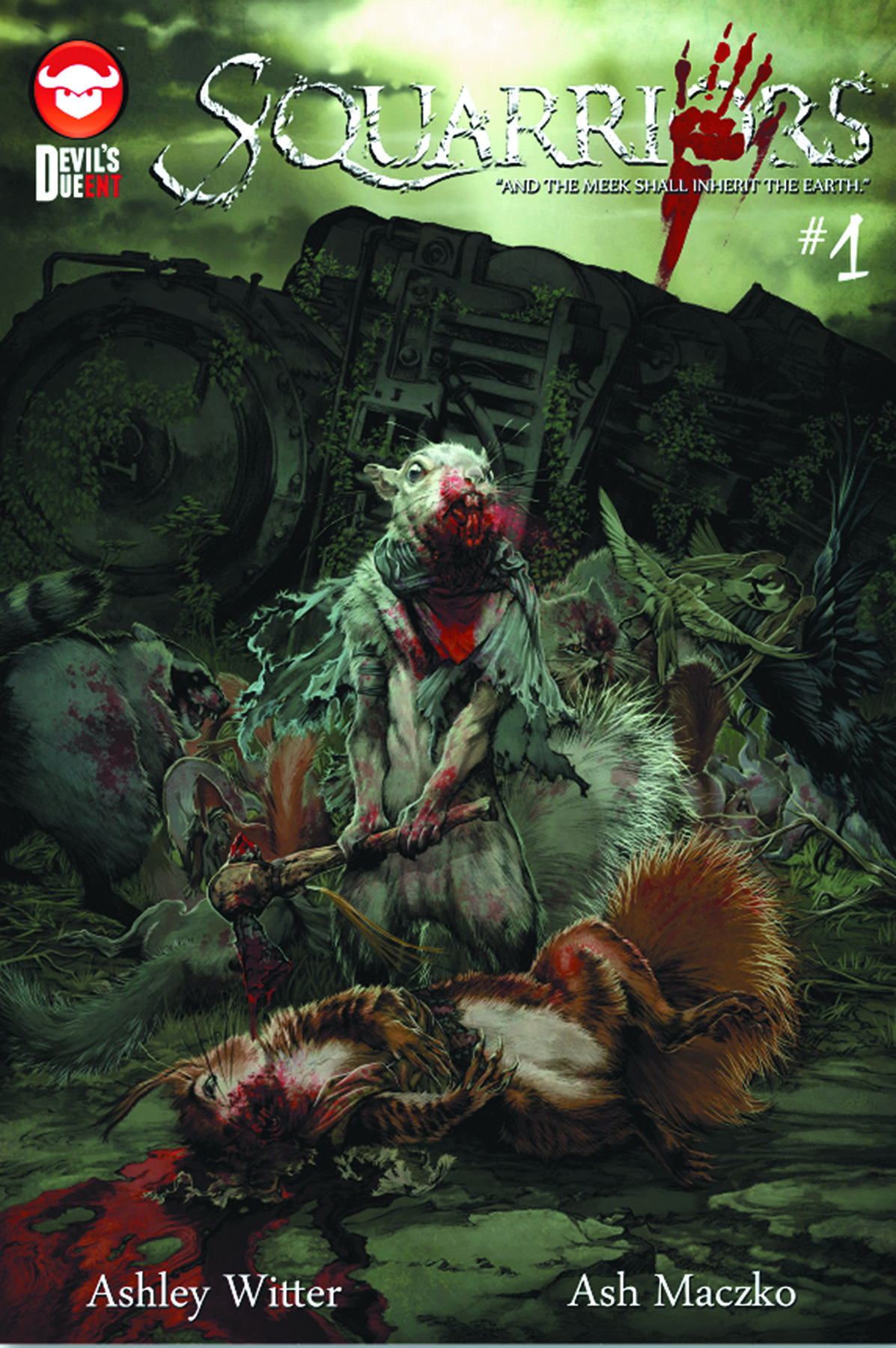
Writer: Ash Maczko
Artist: Ashley Witter
Publisher: Devil’s Due Entertainment
Price: $2 (Digital)
How the heck did a comic that appears, at first appearance (and more), to be about squirrels? Put simply, I was deceived to some small extent when I saw this title on Comixology. Initially, I was just investigating it for the brief amusement of learning more about a comic featuring squirrels as the main characters, but the Comixology preview actually had, to my surprise, humans in it! Being cruel to each other in horrifying ways! So naturally I took it upon myself to make this series a part of Comic Execution, though I can’t lie by omission and not add that the price was a factor.
Writer Ash Maczko is an untested talent in the comic book world and that’s not necessarily surprising. His debut entry is an awkward beast; the first four pages of Squarriors is a thrillingly enigmatic burst of grim violence in a world where things have gone wrong (coincidentally, this is the same length as a Comixology preview D:). But what follows doesn’t connect in any obvious (or even speculative) way, as it abruptly switches to a squirrel-centric tale, one that leans heavily on the tropes of tribal survival in a post-apocalyptic world, its narrative driven weakly by the threatened survival of the clan of furry woodland animals to who our multiple protagonists belong. The real draw are the question implied in the details of this anthropomorphic saga; abandoned human machinery litters the background of their world and the animal denizens refer to us as “the Creators.” These questions don’t get brought up nearly often enough to distract me from the rote cliche of the protagonists’ plight, one that is a trite variation on the typical struggle for survival that shows like Jericho and The Walking Dead have done more effectively. Sure, the characters in question are furry animals instead of people but there’s nothing about that novelty that injects new life into a stale trope. Hell, the writer himself admits later on that he was unaware that nearly identical ideas were already explored in Mouseguard, though if this series has a superior, it’s Watership Down, which it cannily resembles. Hell, one of the most obvious signs that Squarriors has problems is the elaborate and laughably meaningless diagram of the character hierarchy in the backmatter. The fact that Maczko not once touches on the weirdness of the furry animals acting like humans is a telltale sign that we’re not going to see the genuinely interesting stuff for quite a while.
The art work is by Ashley Witter, also a new talent, and she’s significantly better at what she does than Ash Maczko. Her style is ultra-realistic and while it’s clear she’s using a lot of models, it’s impossible that half of the illustrations here aren’t improvised and, as such, her efforts to bring her protagonists to life are commendably imaginative. This doesn’t change the fact that these animals simply don’t have the emotional range of a human and thusly, are simpler to draw. Note I said “simpler,” not simple. Witter doesn’t cut corners and the level of detail is admirable but without human expression to convey the nuances of conversation, so much of the drama here falls flat, despite the energetic posing. Her backgrounds are stunning, as are her colors AND lettering. In fact, if the rest of the book were, like the first four pages, featuring actual humans with human expressions and body language, this book would be an absolute knockout. Instead, it’s frustratingly incomplete.
But it’s also, at least digitally, only $2! And for that price, you get 32 beautiful, uninterrupted, epic pages of comic. Sooo… while I may not be satisfied with the heavily limited impact of the narrative drama as a result of, you know, squirrels, I can’t possibly suggest you pass up what is a decent post-apocalyptic drama at this price. The print issue, as I understand, is $4, and I do not see that as a value for the average reader unless you’re a Mouseguard or Watership Down fan. But, digitally? Don’t pass this up. For now.
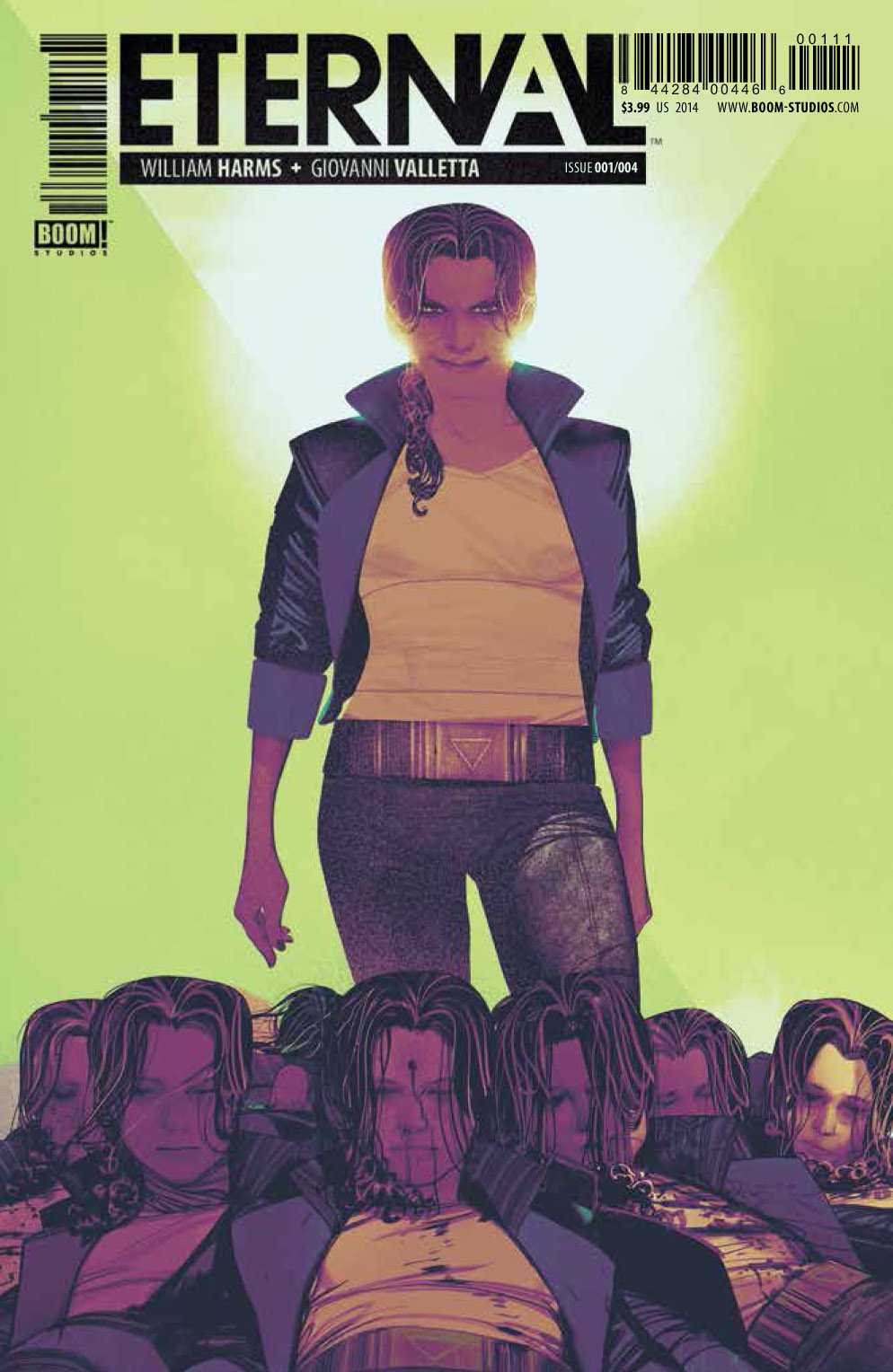 ETERNAL #1
ETERNAL #1
Writer: William Harms
Artist: Giovanni Valetta
Colorist: Adam Metcalfe
Publisher: BOOM! Studios
Price: $4 (Digital)
This was a rough week for Comic Execution picks, if I’m being honest. Bitch Planet somehow seems to have sucked all the potential out of the releases, leaving me with scant few options. Eternal was one of them, falling from the start into the high-concept sci-fi action category that I have mostly left by the wayside as this year has progressed. Let’s see if this one can overcome the handicap of barely fitting into the format of this website and impress.
The series is written by William Harms, a “veteran” video game and comic writer who I’ve never heard of and whose largest comic series to date has been Impaler, one of a dozen reimaginations of the Vlad the Impaler legend. So, we know he’s got the skills, but what’s different about Eternal? Like Revival, it examines the meaning of mortality in a dystopian future where cloning technology means “eternal” life. The narrative specifically follows two people on opposite sides of the conflict between those trying to protect themselves from a seemingly-fascist government, but also briefly touching on a third thread involving the deeper workings of the corporation responsible for the cloning technology. The characters themselves are boilerplate; a strong-willed woman willing to do whatever it takes to stop the evil corporation and the disillusioned cop finally realizing that the order he’s been fighting for is the wrong one. The villains are utterly surfaceless and impossible to hate, as they possess all the generic qualities of a typical dystopian antagonist; white suit, perfect hair, old but not too old, etc. Literally the only thing in this comic that didn’t feel completely rote was the last two pages wherein the protagonist blows up one of the evil corporations’ headquarters with a suicide bomb. And the only reason it surprised me is because of how tasteless it is. Echoing the senseless violence that plagues the Middle East and kills innocent people all over the world in an attempt to make your story edgy does not speak well to your craft.
Here’s a suggestion if you’re trying to write good sci-fi; stop using outdated concepts. The world around us has shown that the real threat to corporations aren’t terrorists with bombs. They’re hackers. Your rebels, by resorting to blowing things up, seem incompetent at best, stupid at worst. The hackers that captured secret CIA files and discredited the entire agency did their deed with almost no resources. Why is that your rebels had seven years yet never managed a similar stunt? Or are we supposed to believe in a future where your evil corporation is just that implacable? Because if that’s the case, your story begins to feel less like sci-fi and more like fantasy. Or just lazy sci-fi.
Giovanni Valetta handles the art and does it quite well considering the challenge of illustrating a dystopian future. There’s tons of details in the panels that bring the world to life and his characters are both solid and expressive, memorably so. Vehicles, buildings, cityscapes, etc, nothing is unavailable to Valetta’s lines. His POVs are dynamic and his layouts are thrilling. Unfortunately, the quality of his lines seems to occasionally fluctuate, as though he was rushed for time. Colorist Adam Metcalfe, a favorite of mine from his work in Translucid, does the series a huge favor by effortlessly evoking the rain-soaked, grimy, yet colorful and lurid world of Blade Runner. Every panel is a new burst of distinctive hues conveying mood and emotion without getting in the way of Valetta’s lines. In fact, Irving outdoes Valetta by being more consistently awesome throughout the whole comic. Letterer Jim Campbell is also in a very capable capacity here, sprinkling each page with nuanced sound effects where needed and boldly busting out the big guns when the action kicks in, not missing a single gunshot, uppercut or explosion, keeping the fonts dynamic and expressive without putting too much into the foreground.
It’s not that Eternal is a bad comic; it has a likable female protagonist, a clever conceit at the core of its story and the artwork is absolutely worth the price. But the writing is just so tedious and predictable and the world of Eternal is nondescript to the point of frustration. I also might not be so negative about this comic if the better written Bitch Planet wasn’t a full fifty cents cheaper with more content to boot. In fact, I think if I had read Eternal first I might be more forgiving but in the light of the glory that is Bitch Planet, it’s hard to love the dry, po-faced tedium of Eternal. Still, it’s a truly beautiful comic at times and it has potential. Let’s give it one more chance, shall we?

